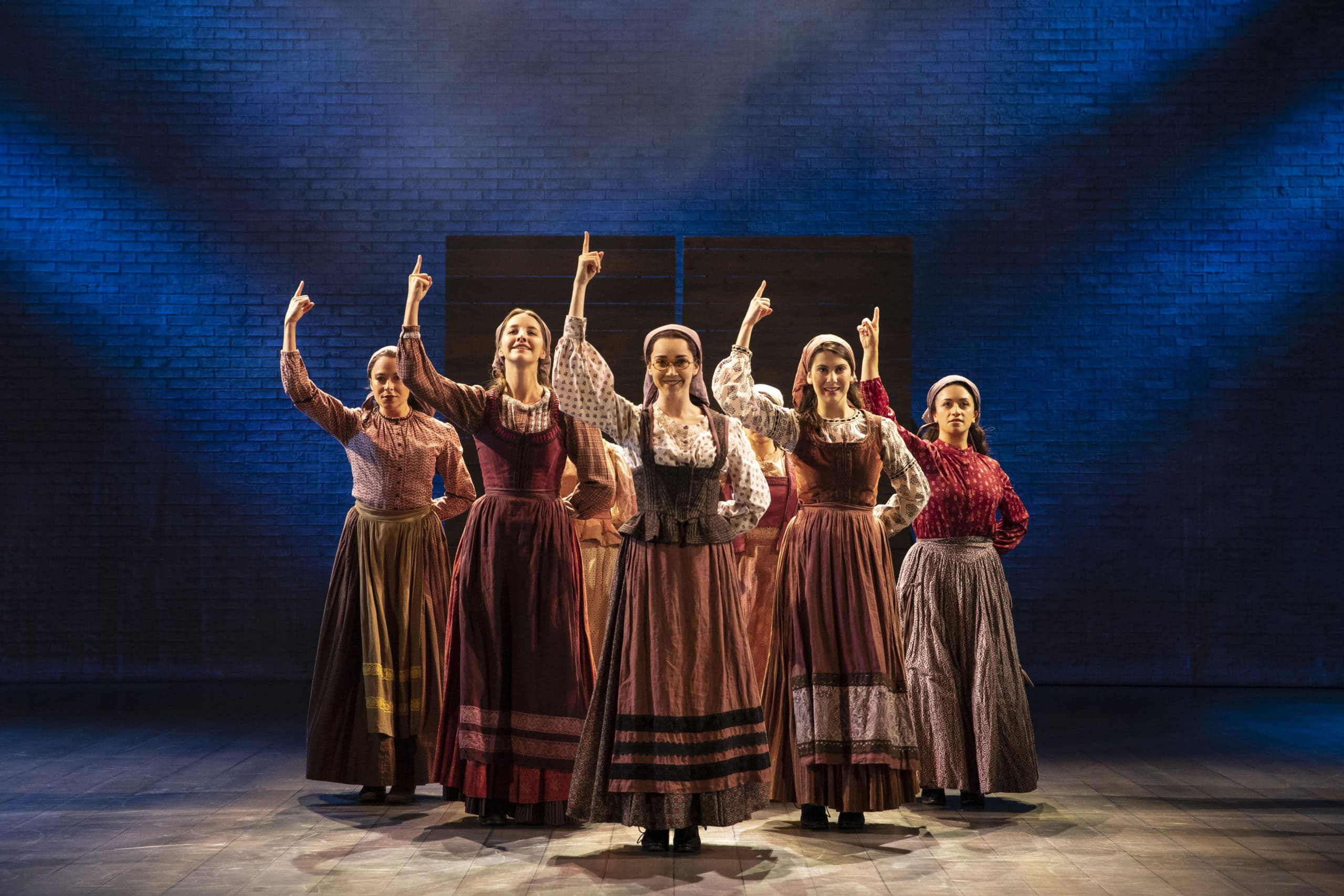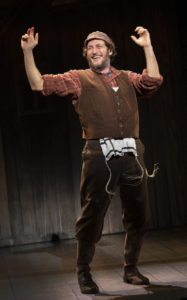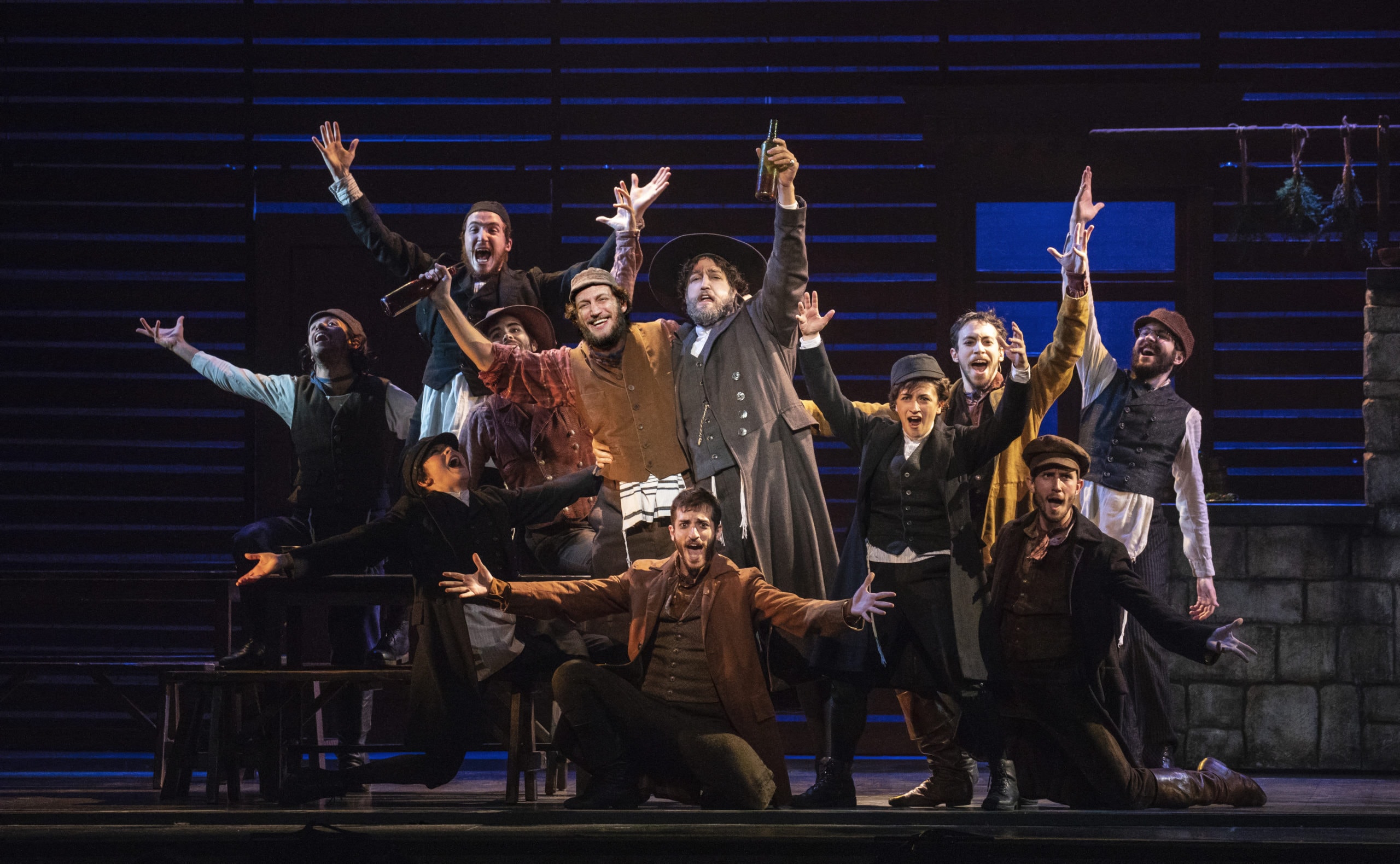Fiddler on the Roof, the quintessentially Jewish musical about keeping one’s balance in changing times, remains ebullient and undiminished in its eternal appeal.

At the opening night performance for the touring company production of Fiddler on the Roof at DC’s National Theatre, the full-house audience showed their genuine appreciation at the rousing dance sequences. There was vigorous applause and plenty of happy talk as the audience proceeded out of the theater after curtain call.
Fiddler on the Roof first appeared in DC in the summer of 1964 in preparation for its September 1964 Broadway opening. So to the creators, cast, and crew of the non-equity production of Fiddler at the National, “L’Chaim.”
Fiddler’s themes are drawn from the richly wrought short stories conjured by Yiddish writer Sholem Aleichem (1859-1916). The stories take place in a small town named Anatevka (in the area of the modern-day Ukraine, but more than a century ago in the “Pale of Settlement” of Imperial Russia).
The original musical of Fiddler is by Joseph Stein (book), with nearly twenty of Jerry Bock’s beautiful melodies and exciting full-throated production numbers and profound, heartfelt lyrics by Sheldon Harnick. It was recently recharged into a Tony-winning revival with original direction by Bartlett Sher, music direction and orchestration by Ted Sperling. Updated choreography by Israeli choreographer Hofesh Shechter was inspired by Jerome Robbins’ original work. The new choreography and other aspects of the touring production are highlighted in this DCMTA feature by my colleague Ravelle Brickman.

Taking on the featured role as Tevye, the earnest, wise milkman, is Israeli film and TV star Yehezkel Lazarov. Generational and family conflict is one of the major matters at hand as Tevye and his three older daughters and his wife differ about what is acceptable behavior when ancient traditions and changing times are at odds. Later, other conflicts are at the forefront: those between the Russian Czar and his subjects, the Jewish residents of Anatevka.
Lazarov is a Tevye with an earthy personality; a man who uses humor even as he deals with sorrow and horror while shaking his fist up at God. Then comes a shrug as he looks back to earth when there is no response from God.
Lazarov’s delivery of humor is lighthearted with a speedy delivery like a rimshot especially with his “on the one hand and on the other hand” routine. He is a wonder dispensing his folksy wisdom and comical bantering. As a singer, Lazarov puts his own warm baritone stamp on golden tunes such as “If I Were a Rich Man” and “Do You Love Me?”
The character Tevye has persistent conflicts with his three older daughters. The three daughters are played as forward thinkers raising their voices in an isolated, tradition-bound community. They are early feminists, each in their own way. Kelly Gabrielle Murphy plays Tzeitel, the first to take on her father’s time-honored views on love and marriage. Next is Hodel, played by Ruthy Froch. Froch’s lovely, heart-rending delivery of the touching “Far From the Home I Love” is among the show’s solo singing highlights. Noa Luz Barenblat is Chava, the daughter who goes the furthest from the path of her mother and father by marrying a non-Jew. All were spot-on and genuine.
Maite Uzal is the strong-willed Golde, Tevye’s wife. She is not one to mess with as she orders her daughters about. Nick Siccone is the timid Motel the tailor, who marries Tzeitel and covets a used sewing machine. Nic Casaula is a strong presence as Perchik, the student socialist who brings new ideas to Anatevka about the limitations of capitalism and the Czar.
They are joined by Jonathan Von Mering as Lazar Wolf, a gruff older widower and butcher who finds himself on the outside looking in when it comes to marriage. Carol Beaugard is the purposefully annoying matchmaker character named Yente. (For those less familiar with Yiddish, a yenta is a busybody or gossip)

There are a number of dance scenes that stand out upon the many wonderful ones. The opening full company number that introduces everyone, “Tradition,” is totally awakening, upbeat, and stirring. It is also fun. Then there is “To Life (L’Chaim),” with choreography that dazzles with its rousing nature. The Act I number provides hints of possible coexistence between the Jewish residents (at least the males) and the Russians (at least the males). It is energetic joy fueled by faux alcohol with a boatload of robust foot-stomping and hearty hand waving. The dancers’ endurance is impressive. Act I also has the extravagance of “Tevye’s Dream” with its use of masks and other props as central features.
Another stand-out dance sequence is the allure of the “Bottle Dance” routine in “The Wedding” that concludes Act I. The National Theater audience (including me) sat in amazed silence, leaning forward with enchantment. We applauded and applauded. But, then with Act II, life for Anatevka’s residents becomes subdued and darker, much darker.
The scenic design for Fiddler involves many a smoothly dropped in or pulled from the wings set piece. What the audience first sees upon entering the National Theatre is a bare stage with a bare “brick” wall and a pitiful sign with the name Anatevka hanging at audience right. Soon appears the famous Fiddler himself (though not on a rooftop) and a contemporary dressed man in a parka. The man takes off his parka. He transforms into Tevye.
Enduring and far from a museum piece, Fiddler on the Roof remains what it has been for over five decades: a musical with a heart and appeal. In our current fraught times, to not connect Fiddler with current issues surrounding contemporary migrants, immigrants, and refugees seeking entry to America for better lives for themselves and their children would be a “shonda” (a Yiddish word for a great shame). For isn’t that the universal, timeless quality and appeal that is Fiddler on the Roof? After all, no one group owns the Fiddler story, does it?
So “l‘chaim to life!/ God would like us to be joyful/ Even when our hearts lie panting on the floor/ But how much more can we be joyful.”
Running Time: About three hours with one 15-minute intermission.
Fiddler on the Roof plays through December 15, 2019, at the National Theatre, 1321 Pennsylvania Ave, (facing Pennsylvania Avenue and overlooking Freedom Plaza), Washington, DC. For tickets, call the box office at 800-514-3849 or go online.
Song list
Act One
- Prologue: Tradition – Tevye and the Villagers
- Matchmaker, Matchmaker – Tzeitel, Hodel and Chava
- If I Were a Rich Man – Tevye
- Sabbath Prayer – Tevye, Golde and the Villagers
- To Life – Tevye, Lazar Wolf and the Villagers
- Tevye’s Monologue – Tevye
- Miracle of Miracles – Motel
- Tevye’s Dream – Tevye, Golde, Grandma Tzeitel, Fruma-Sarah and the Company
- Sunrise, Sunset – Tevye, Golde, Perchik, Hodel and the Company
- The Bottle Dance – The Villagers
Act Two
- Entr’acte – Orchestra
- Now I Have Everything – Perchik and Hodel
- Tevye’s Monologue (reprise) – Tevye
- Do You Love Me? – Tevye and Golde
- The Rumor – Yente and villagers
- Far From the Home I Love – Hodel
- Chavaleh – Tevye
- Anatevka – The Villagers




